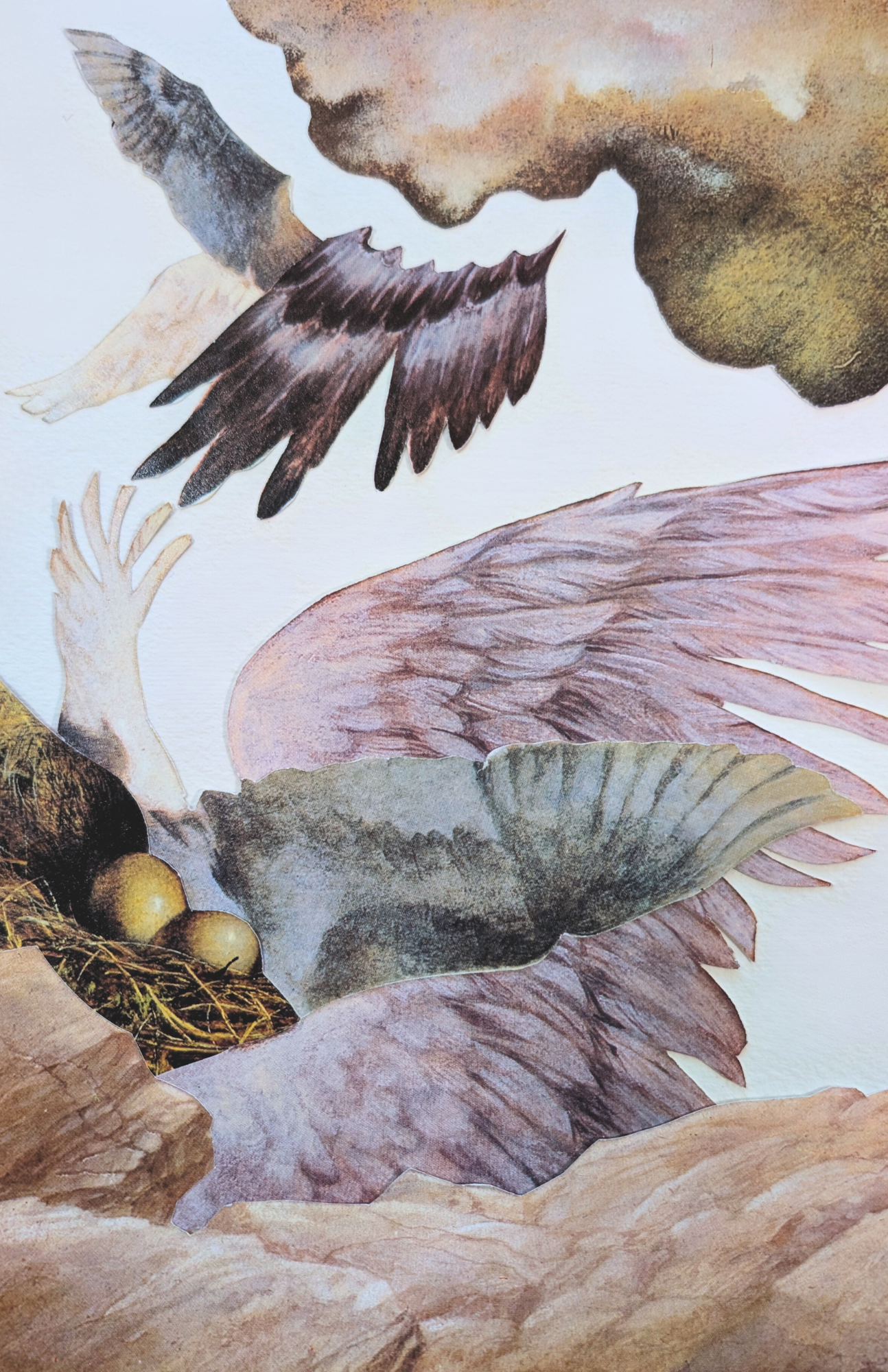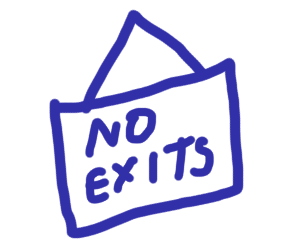I looked into the valley and the valley looked back, Nick Naudi
April 2025

The landscape from that day at Kohler-Andrae. Courtesy of the author
My wife and I took a day trip to Kohler-Andrae State Park a few years ago. When I say I love Wisconsin, I think I really mean I love Lake Michigan. The effect it has on every place I’ve ever called home, its width, its grandness. I can’t visit any of our state parks without thinking about the glaciers that made them, the basins and hills and smattering of boulders carried by ice that melted millions of years ago. The Great Lakes are their greatest reminder of having existed. Kohler-Andrae State Park is mostly sand, dunes that rise and fall like waves, the seemingly endless coastline of the lake at its side. The park itself is not far from the highway but it feels as distant from the cacophony of daily life as an alien planet. There’s this intense hush in the air, sound absorbed by the rolling land and water.
We stood at the top of a dune that day and spotted two sandhill cranes in the valley below. Sandhill cranes mate for life and they are often found in pairs like this. Their steps were cautious in a graceful kind of way, maybe they were rooting for something to eat or maybe they were just walking together. But watching them, their silence, their synchronous movements, I was overwhelmed by the sensation that I was looking into a mirror. That the cranes were us, or, how we would meet again in another life. We would return as those cranes, in the embrace of these hills, in the softness of sand and brush.
We stood at the top of a dune that day and spotted two sandhill cranes in the valley below. Sandhill cranes mate for life and they are often found in pairs like this. Their steps were cautious in a graceful kind of way, maybe they were rooting for something to eat or maybe they were just walking together. But watching them, their silence, their synchronous movements, I was overwhelmed by the sensation that I was looking into a mirror. That the cranes were us, or, how we would meet again in another life. We would return as those cranes, in the embrace of these hills, in the softness of sand and brush.

Sand and dragonfly from that day at Kohler-Andrae. Courtesy of the author
***
A year ago, in our kitchen, I looked up at my wife and drunkenly said, I think I’m trans. I had never said the words out loud. I didn’t know how else to unburden myself from the weight they carried in my head so I tumbled them out like rocks into her hands. She knew what to do with them as much as I did, and so they continued to tumble, awkwardly, clatteringly. Eventually, I cut my hair. I borrowed her clothes, her men’s clothes. And it felt good, it felt complete, it felt like coming home.
Not too long after that, I stood in the candy aisle of a gas station, buying snacks to bring back to my hotel. I was on a work trip some place so far from any restaurant or grocery store that the gas station was the only place I could get anything to eat. I held my phone tight against my ear, not wanting to miss a word of my wife’s voice. She told me she had tried on my clothes, my women’s clothes, and it felt good. It felt complete. It felt like coming home.
We have been together eleven years, married for five. But it was there, between sour gummy worms and fluorescent buzzing, I heard the voice that had been inside her since the glaciers, the cranes, our kitchen – the woman she has always been.

A collage I made inspired by the sandhill cranes. Courtesy of the author
***
We now sit with our legs crunched under ourselves, smooshed into the corners of our couch. We assume this position whenever we’re about to hunker in for a chat or a movie or both.
What’s the connection between femininity and softness? I ask her.
She ponders for a bit.
“It’s unapologetically loving myself. Being feminine is synonymous with inner calmness.”
She pauses.
“I do have trouble with that word. There’s something to be said about relating softness to femininity as just being… misogynistic.”
We talk about the complexity of the word in description of gender, the cage it creates. How, for me, I grew up with the expectation of softness. That to be a woman is to be feminine is to be soft. We talk about the fact that there are women who don’t connect with softness and men that do and both and neither. There is an overlap of experience here we’ve talked about before, even before coming out, before we knew to look at it through the lens of identity at all. We both share the experience of growing up flattened, violated and diminished by the endless feedback loops of social norms and presumptions. We’ve both felt the dissonance of not resonating with the ones we were supposed to resonate with, and the inability to articulate the wound it makes. The weakness of soft, the expected weakness of women, the impossibility of softness in men.
We go back to my original question and she adds, “It’s how I talk to myself. It’s allowing myself to feel comfortable.”
I love her answer because it isn’t about the stereotype of equating the two, it’s a declaration of the relief that femininity gives her. It’s her.
We then, mostly through giggles, talk about softness in the literal sense. She is physically softer since starting HRT. Her skin is smoother. Her arms and hands and thighs and stomach are more rounded. But more than this, I see it in the comfort in her own body, the kindness of confidence and how it radiates from her these days. It’s visible. It’s tangible.
“It’s being true to your inner core, what makes you feel good.”
I think about our exchange of clothes, giving things we outgrew new purpose. It’s both convenient and connective, the power of presentation and its effect on inner alignment, nebulous as it may be. Nebulous comes up frequently in our conversation. “Indescribable,” she says. Outside the cage of explanation and yet I get it. I feel it too.
“It would have been much harder to explore alone.”
It does feel lonely, to do something so individual, to sift through endless questions waiting for the proof that will finally make it feel concrete. The fact that there is no one trans experience is both magnificently uplifting and intensely lonely, especially in the beginning, when the only thing I could do was be so struck by the white hot flash of “fuck it” that I clattered the words onto the floor like dirty dishes. I wanted there to be one answer. To take the final Am I trans? online quiz, to quantify myself like an exam. It’s lonely, the crushing realization that no one will name it for you. You can be equipped with all the vocab, the literature, study it, turn it into algebra. But there is no one, no other mouth but your own, no other shitty haircut but your own, no one else’s fumbling but your own, no other tears but your own, and no other joy but your own, to answer yes. And when you listen beyond the echo of it, the yes that rebounds off the cavern walls of loneliness, there is a din. Other voices, other yeses like blessings. Offerings of experience, support, outworn clothes.
I reflect on all the selves we’ve been and are and will be. The bond of getting older, the miracle of getting older and remaining curious about yourself. The miracle that we did not crystalize as the two lonely, terrified people that met. The miracle that we are here, that every feeling that you have ever felt has been felt by someone else, too. The paradox of loneliness shared. The miracle of transition.
My first question has no answer, I know. It asks my wife to draw a line between two extricable things, to collapse them as we were collapsed in childhood. Femme is soft is hard is men is masc is sand. It’s unapologetically loving myself.
I think we are born tender: the years, brick by brick, build an exterior, a second skin of rules. What girls should do. What boys should do. And never, and always. Growth is the work done in the same years, brick by brick undoing the masonry, to peer back inside, down into the valley, return to animal softness. Sandhill cranes. Tawny grass. What shape am I, really?
Nick Naudi is a Milwaukee-based educator, artist, and cinephile. Maker of zines, digital illustration, collage and video, writer of poetry and short works, Nick is nourished by stories and the courageous act of sharing them.
